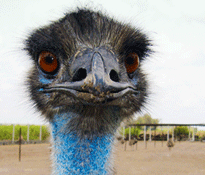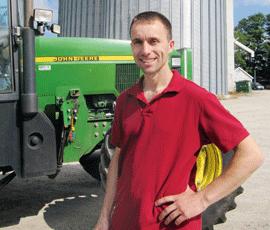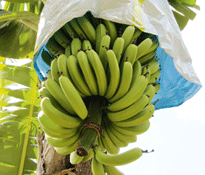Learn and travel with Nuffield

A Nuffield Scholarship gave Caroline Stocks a chance to see farming around the world – here she recounts a few of her highlights and gives advice to would-be scholars
Catching up with the Amish: Pennsylvania, USA
Today, I learned I definitely wouldn’t want to live near a composting facility. Be thankful these photos come smell-free.
The visit here was part of learning how mushrooms are produced – apparently Pennsylvania accounts for 35% of all the fungi produced in the USA so they need a lot of compost to grow them on. The second part of the tour was more enjoyable, but I’m still not convinced fungus would be my career move of choice – picking hundreds of thousands of mushrooms by hand in darkened rooms does not really appeal.
Perhaps the most interesting part of the day, though, was this morning’s visit to an Amish farm. Seeing people produce food with so little mechanisation was fascinating, if not a little strange considering our host told us he used GM crops. Who would’ve thought it’d be possible to say the Amish community had overtaken UK farmers in terms of technology?
Sneezy going through Canadian farmland: Guelph, Canada
Maybe I was asking for trouble when I took my fancy handbag with me on a trip to a goat farm.
Maybe it was my own fault for getting so close to try and take a photo.
Nuffield farming scholarships are open to anyone involved with the farming industry. |
|---|
My encounter with the runny-nosed ruminant came about during a whistle-stop tour of farms around the Guelph area. I visited three farmers who all had very different enterprises.
There was Paul and his grain storage and farm supplies business, Brent and his turkeys and sheep and ex-pig farmer Greg with his goats and lambs.
It’s apparently unusual to see farmers who rear sheep in Canada. The country only produces enough lamb to meet 40% of demand – the rest is imported from New Zealand and can only be bought frozen from the supermarket.
In the past, demand for sheep and goat meat hasn’t been very strong, which is why few producers have bothered with it. But these two forward-thinking chaps are hoping to take advantage of a growing demand from Canada’s rapidly-expanding ethnic and immigrant markets.
 |
|---|
Arable farmer Paul with some of his grain store facilities in Canada. |
Chasing developments in animal genetics: Mharashta, India
 Today I’ve learnt several fascinating facts about Rod Hull’s special friend, the emu:
Today I’ve learnt several fascinating facts about Rod Hull’s special friend, the emu:
1 – They are growing in popularity in India because they are incredibly efficient animals. More than 90% of every bird can be used, from the meat, to the skin (used for bags and shoes), to the bones (which are rendered for bonemeal).
2 – Emu’s feathers can be plucked and then spun into wool.
3 – Emu meat is incredibly good for you. It’s low in fat and high in iron and is being touted as a health food here in India.
And finally, 4 – Emu meat taste like chicken. Though doesn’t everything?
So who’d pay the ransom?
There were a good few minutes today when I genuinely thought I was being kidnapped.
It says a lot about me that during that time I a) updated my Facebook status with words to that effect and b) started thinking about whether I could surreptitiously hide my iPhone in my shoe without it being discovered.
I was about 300 miles north of Delhi. I’d driven out there with my Indian farming chum, Ricky, who’s spokesman of the Indian Poultry Federation.
Ricky decided we’d stop off in a remote village so he could call in on his friend, who lives opposite a timber merchant.
Realising I have a thing for taking photos, Ricky sent me over the road to photograph the mill in action.
Having taken some snaps, I was led out of the back of the mill to randomly find a blacked-out, swish-looking car waiting there with its doors open. Without being given a second to turn around, I was bundled in by two men, the doors closed and off we shot.
In hindsight we were probably only in the car for 10 minutes, but it felt like we were driving down a scary, dark labyrinth of alleyways for hours. The non-English-speaking men who had got into the car with me took my camera off me, passing it around as I flapped my arms about trying to get them to get them to understand that they had to take me back.
Happily, it turned out I wasn’t being robbed or kidnapped and this was actually a show of well-meant but scary Indian hospitality. I was, in fact, being taken to a soap factory.
Is a Nuffield Scholarship for me? If you work in the agricultural industry in some way, you feel like you need a challenge and want to do something different, then the answer’s ‘yes’. From travelling to some amazing places, gaining some incredible contacts and having your eyes open to a wealth of opportunities, the Nuffield experience is one I cannot recommend enough. Being thrown together with farmers, industry experts and policy makers from around the world can feel daunting – as can the thought of heading off to strange countries with little more than a map and a change of clothing. But a scholarship gives you confidence you never realised you had and the benefits you gain from doing it make you forget any worries you have at the beginning. If you’re unsure whether a scholarship is for you, the best thing to do is talk to someone who has done one and see how it has changed their life. There are contact details on the Nuffield website www.nuffieldscholar.org, or you can contact Nuffield director John Stones, nuffielddirector@aol.com |
|---|
Thankfully, Indian tea comes very, very strong and very, very sweet. Maybe they’re used to having to revive their guests from shock.
Goin’ bananas: Queensland, Australia
 If there’s one thing I’ve learned on my travels, it’s that farmers in the UK share pretty much the same problems as every other farmer in the world.
If there’s one thing I’ve learned on my travels, it’s that farmers in the UK share pretty much the same problems as every other farmer in the world.
Supply and demand, retailer power, pricing, red tape and high input costs are affecting producers in every country I’ve been to so far, and Australia is certainly no different.
Today I visited Doug, who grows bananas.
Fruit from the plants covering Doug’s 200 acre unit are harvested each week and taken to a processing plant about a mile down the road where they’re washed, cut into bunches, packed and then sent off in trucks to supermarkets in Brisbane and Sydney.
It’s a simple system and one that should work pretty well – the biggest challenge for a banana farmer seems to be trying to keep the fruit’s skin blemish-free so picky shoppers aren’t put off from buying it.
But this year things aren’t quite so simple.
A warm, damp winter has meant that bananas have continued to grow in abundance during a season when consumer demand for the fruit tails off.
The result? Massive over-supply, plummeting prices, huge amounts of fruit going to waste and banana farmers being forced out of the industry.
Australia’s food retail market is pretty much a duopoly between Woolworths and Coles and the oversupply means these two retailers can be even pickier than usual and drive down prices even more. Sound familiar?
If you’re apply for a scholarship
Do:
* Think carefully about the subject you want to study – you will live and breathe it while you are travelling, so make sure it’s something you’re passionate about
* Be brave in the countries you decide to visit. Often the far-flung places are the ones that provide the best experiences and ideas
* Find past scholars to talk to about their experiences and to give you backing during the application and travelling process
Don’t:
* Be shy on your application form about what makes you a good candidate
* Rush filling in your application form. Give some thought to how you think this experience could help your business – and more importantly, you – grow.
* Be scared about leaving your job for six weeks or more – often to their bemusement, most scholars find their businesses and workforce thrive by being given more responsibility in their absence
Have your say on the Nuffield scholarship on our forums

